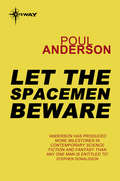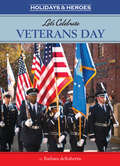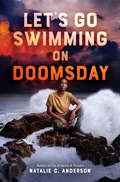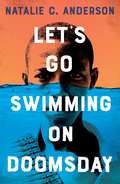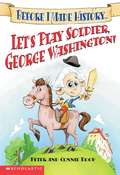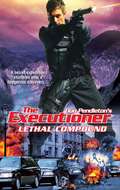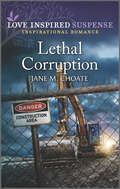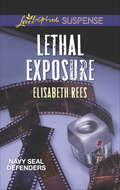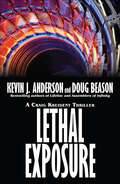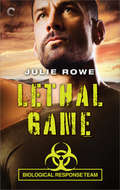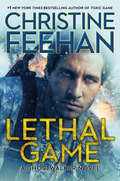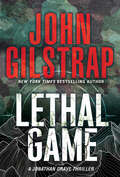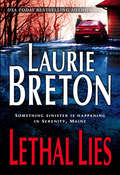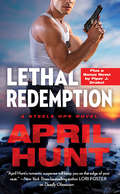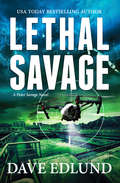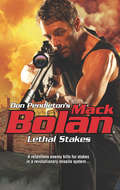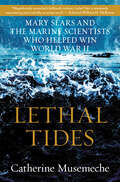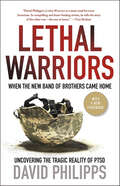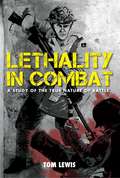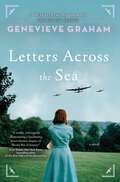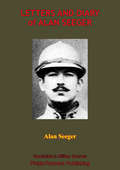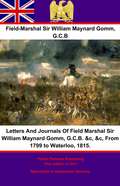- Table View
- List View
Let the Spacemen Beware
by Poul AndersonTo the men of the starship Quetzal their task seemed routine: to establish diplomatic relations and enter into trade negotiations with the people of a newly discovered planet. Since to all appearances the folk of Gwydion were the most thoroughly amiable in all the galaxy - words for such concepts as war, theft, anger, murder and jealousy did not even exist in their language - there could hardly be a problem. But as the season changed on Gwydion, so did the people...
Let's Celebrate Veterans Day (Holidays & Heros)
by Barbara deRubertisWho is a veteran? By exploring the kinds of work that men and women do as they serve in the five branches of the military, we can better appreciate our veterans. And we discover some of the many reasons we honor and celebrate them each year on November 11.
Let's Go Swimming on Doomsday
by Natalie C. AndersonForced to become a child soldier, a sixteen-year-old Somali refugee must confront his painful past in this haunting, thrilling tale of loss and redemption for fans of A Long Way Gone and What is the What When Abdi's family is kidnapped, he's forced to do the unthinkable: become a child soldier with the ruthless jihadi group Al Shabaab. <P><P>In order to save the lives of those he loves, and earn their freedom, Abdi agrees to be embedded as a spy within the militia's ranks and to send dispatches on their plans to the Americans. The jihadists trust Abdi immediately because his older brother, Dahir, is already one of them, protégé to General Idris, aka the Butcher. If Abdi's duplicity is discovered, he will be killed. <P><P>For weeks, Abdi trains with them, witnessing atrocity after atrocity, becoming a monster himself, wondering if he's even pretending anymore. He only escapes after he is forced into a suicide bomber's vest, which still leaves him stumps where two of his fingers used to be and his brother near death. Eventually, he finds himself on the streets of Sangui City, Kenya, stealing what he can find to get by, sleeping nights in empty alleyways, wondering what's become of the family that was stolen from him. <P><P>But everything changes when Abdi's picked up for a petty theft, which sets into motion a chain reaction that forces him to reckon with a past he's been trying to forget. In this riveting, unflinching tale of sacrifice and hope, critically-acclaimed author Natalie C. Anderson delivers another tour-de-force that will leave readers at the edge of their seats.
Let's Go Swimming on Doomsday
by Natalie C. AndersonI tell myself I&’ve chosen to live, but the water knows the truth. Waves brush my arms, soft as shroud linen. The water knows I have to die. Three years after his older brother is recruited by the Somali militia group Al Shaabab, Abdi and his family are kidnapped by Americans. In exchange for their freedom, he reluctantly agrees to go undercover to rescue his brother and help foil deadly attacks. After months in their ranks, Abdi finally escapes. Haunted and alone on the streets of Kenya, he steals what he can to get by. But an arrest for petty theft sets in motion a chain of events that force him to confront the past he&’s been so desperately trying to forget.
Let's Play Soldier, George Washington! (Before I Made History)
by Peter Roop Connie RoopWhat you might not know is that: General Washington led our American army to victory in the Revolutionary War. President Washington was our first President. George Washington had no children of his own. George Washington fought a war so Americans could be free. We celebrate George Washington's birthday in February on Presidents' Day. But did you know George Washington really had two birthdays? George Washington's face is on every dollar bill.
Lethal Compound
by Don PendletonU. S. intelligence agents become aware of a wealthy American's plans only when they intercept the chatter of Chinese spies. It is the billionaire's intention to lead a secret archaeological expedition into the mountainous border triangle between Afghanistan, China and Tajikistan. Mack Bolan is inserted within the group as they head into an area that is a hotbed of opium production. Traveling undercover with a group of foreign mercenaries hired to act as private security, Bolan knows that priceless treasure isn't the only thing hidden in the mountains of Tajikistan. And when they come under attack by Russian fighter jets, it becomes apparent to the Executioner that the unstable region is about to blow.
Lethal Corruption
by Jane M. ChoateA major case places an ambitious attorney’s life in danger in this inspirational romantic suspense thriller.Nothing will stop deputy district attorney Shannon DeFord from prosecuting the biggest case of her career—not even a warning at knifepoint. Unsure of who to trust, she accepts security expert Rafe Zuniga’s daily protection. But when the threats turn deadly, they both know this is more than a typical criminal trial. Together, can they unravel a conspiracy . . . or will the truth get them killed?From Love Inspired Suspense: Courage. Danger. Faith.
Lethal Exposure (Navy SEAL Defenders)
by Elisabeth ReesAn ex-Navy SEAL leaps into action to protect a photographer and her children from harm in this inspirational romantic suspense adventure.When single mother and photographer Rebecca Grey’s home is invaded, she calls former Navy SEAL Conrad “Jack” Jackson. Though she’d never betray her late husband’s memory by falling for his fellow soldier, she’s desperate for Jack’s help. Rebecca is in possession of photos that can expose a plot to sell priceless artwork stolen from a Middle Eastern palace. Now a dangerous enemy wants her to either surrender the pictures . . . or her life. Jack promised his best friend he’d lay down his life for Rebecca and her daughters. And as the danger lurks ever closer, that’s just what he may have to do to save her.“This tale gets off to a dramatic and tense start. Complex characters combine with strong writing in this totally entertaining suspense.” —RT Book Reviews
Lethal Exposure (The Craig Kreident Thrillers)
by Kevin J. Anderson Doug BeasonAt Fermilab near Chicago, researchers use the world’s largest particle accelerator to unlock the secrets of the subatomic universe. While working late one night, Dr. Georg Dumenico—candidate for the Nobel Prize in physics—is bombarded with a lethal exposure of radiation. He will die horribly within days. FBI Special Agent Craig Kreident knows it was no accident—but he has to prove it, and the clock is ticking. The nation’s most valued research is at stake, and only Dumenico himself knows enough to track down his own murderer…if he survives long enough to do it.
Lethal Game
by Julie RoweBook two of Biological Response TeamAs the nation's youngest virologist and hematologist, Captain Sophia Perry has always been one step ahead of her peers. But there's one thing she can't beat--cancer. She wants to make a difference in the time she has left, so when she's sent to investigate a breakout at a Syrian refugee camp, she goes, saying nothing of her diagnosis. But saving the masses isn't easy when the man tasked to protect her is so irresistible.Communications Sergeant Connor Button is back on active duty after a deadly explosion, but he doesn't feel whole again until he meets Sophia. Assigned to keep her safe, he's prepared to die for her, but for the first time in months he truly wants to live--if only she wasn't so determined to put them both in danger.With a secret to keep and nothing to lose, Sophia is determined to find the source of the breakout at any cost. Violent attacks on the camp convince her that someone wants her to pay dearly. But as Sophia's health deteriorates, Connor must find a way to help her defeat her enemies before her body defeats her.72,000 words
Lethal Game (A GhostWalker Novel #16)
by Christine FeehanThe sparks of unexpected passion ignite in this electrifying GhostWalker novel from #1 New York Times bestselling author Christine Feehan. When Malichai Fortunes attacks a problem, he does it full force—a habit that earns the GhostWalker a painful injury and a forced vacation in San Diego, California. <P><P>With nothing but physical therapy on the horizon, Malichai is starting to get restless...until a striking blue-eyed blonde makes all his senses come alive. Amaryllis is kind and warm and sees beyond Malichai’s rough exterior, but he can tell there’s something she’s hiding. Her innate healing abilities indicate she might be a GhostWalker—albeit an untrained one. <P><P>Malichai doesn’t think their paths crossing is anything more than coincidence, but he can sense that one wrong word could send Amaryllis running. <P><P>When strange events at his temporary retreat put Malichai on high alert, he knows he won&’t be able to deal with the threat and keep his woman safe in his weakened state. But calling in his brothers means telling Amaryllis what he really is, and revealing that he knows the truth about her too.… <P><P><b>A New York Times Bestseller</b>
Lethal Game: A Riveting Black Ops Thriller (A Jonathan Grave Thriller #14)
by John Gilstrap&“[Gilstrap&’s] greatest strength is the ability to blend breathtaking action with deep emotion regarding the characters.&” —Jeffery DeaverThe exhilarating new thriller from the New York Times and USA Today bestselling author takes readers on an action-packed thrill ride from the wilds of Montana to the streets of Mexico, as a sniper attack turns wilderness hunters into the hunted and Grave&’s enemies stalk him with a vengeance… Hostage rescue expert Jonathan Grave and his fellow special-ops veteran, Boxers, are hunting in Montana when shots ring out, and they realize they&’ve become the prey for assassins. In the crosshairs of unseen shooters, cut off from all communication, with the wind at a blood-freezing chill, the nightmare is just beginning. Because Jonathan and Boxers aren&’t the only ones under fire. Back in Fisherman&’s Cove, Virginia, Jonathan&’s Security Solutions team is fighting for their lives too. A vicious onslaught is clearing the way for a much bigger game by eliminating anyone in the way. If Jonathan and Boxers can make it out of the wilderness alive, the real war will begin. "When you pick up a John Gilstrap novel one thing is always true, you are going to be entertained at a high rate of speed." —Suspense Magazine &“Fans of adventure stories will find plenty to like.&” —Publishers Weekly
Lethal Lies
by Laurie BretonChelsea Logan never gets the chance to file the storythat would have shocked the blue-collar town ofSerenity, Maine, to its core. Her death is ruled asuicide, but her cousin Faith Pelletier knows Chelseabetter than that. Faith returns to their hometown andbegins to ask questions-questions that no one wantsto answer. And it’s not long before she uncovers somenasty little truths about life in this fading mill town.As Faith closes in on a web of drugs and violence,she is forced to turn to police chief Ty Savage forinformation. After all these years he still gets underher skin, but should she trust him? As the circle ofdeceit draws ever tighter, Faith must outwit a facelessenemy who will stop at nothing to have her silenced.
Lethal Lies (Blood Brothers #2)
by Rebecca ZanettiA deadly secret can't stay buried forever . . . Revenge. It's the only thing that will help Anya Best sleep at night. The serial killer who murdered her sister is on the loose, and Anya will stop at nothing to put him behind bars-even use herself as bait to lure him out of hiding. But she can't do this alone.Private investigator Heath Jones's job is to bring bastards to justice. This time it's personal. He knew the Copper Killer's latest victim so when her sister asks for his help, he's all in. But when Anya uses the media to taunt the killer, she exposes Heath's identity, putting them both in jeopardy. Now, secrets buried long ago are coming to light and the forces determined to destroy him are watching Heath's every move, waiting to exact their own revenge. And they'll use anything and anyone to get to Heath.With twists and turns that will take your breath away, LETHAL LIES is sexy, action-packed suspense at its very best from New York Times bestselling author Rebecca Zanetti.
Lethal Nights: A Brute Force Novel (Brute Force #3)
by Lora Leigh#1 bestselling author Lora Leigh turns up the heat in her latest novel of high-stakes passion and persuasion featuring the men of Brute Force.Ilya Dragonovich is no stranger to the dark side. As a safe-house owner for security agency Brute Force, Dragon knows that the battle line between good and evil runs through the heart of every man—and, sometimes, a beautiful woman…Emma Jane Preston needs help. After her marriage crumbled, she believed she could get back to a normal, happy life. But now she needs the kind of protection that comes at a cost—one that only someone like Dragon can provide. But can Emma Jane trust this handsome, undercover operator to keep her safe when she is in danger of falling into the arms of the deeply seductive, fiery Dragon. . .and never letting go?“Leigh’s books can scorch the ink off the page.”—RT Book Reviews
Lethal Redemption: Two full books for the price of one (Steele Ops #2)
by April HuntApril Hunt "will keep you on the edge of your seat" (Lori Foster, New York Times bestselling author) in this heart-pounding new romantic suspense.Top FBI profiler Grace Steele was just a girl when she escaped the Order of the New Dawn, and she's spent the last seventeen years trying to forget her time there. But when private security firm Steele Ops needs her help extracting a young woman from the secretive cult's clutches, she's all in. Even though the mission requires posing as the fiancée of the only man who's ever broken her heart.It's been nine years since Cade Wright turned his back on his childhood sweetheart, and he's never stopped regretting it. Now that they're forced to work together, he knows this is his opportunity to show Grace how much he's changed. But the deeper they get pulled into New Dawn, the clearer it becomes that the demons still haunting Grace are very real, and Cade will have to risk everything to keep her safe . . . including his own life.Includes the bonus novel Extreme Honor by Piper J. Drake!
Lethal Savage: A Peter Savage Novel (Peter Savage #6)
by Dave Edlund"I would follow Peter Savage into any firefight." -James Rollins, New York Times bestseller of The Demon CrownTwo men, one driven to the edge of sanity by heart-breaking losses, the other craving revenge, conspire to reshape America and bring her population to their knees.When young men on the Warm Springs Reservation in Central Oregon are stricken with an unidentified disease that leaves them sterile, Peter Savage is called to aid in the investigation.With the inquiry gaining momentum, Peter is kidnapped by hardened mercenaries. In the remote high desert of Oregon, Peter finds himself face to face with a demon from his past-an adversary who has seemingly risen from the grave.As the minutes count down to a biological holocaust, Peter presents the only chance to save an unwitting civilian population. With his trusted canine companion Diesel by his side, along with a former-assassin-turned-ally, Peter must gamble far more than his own life… and the odds have never been so long..Praise for Dave Edlund's Peter Savage Novels"I would follow Peter Savage into any firefight." -James Rollins,New York Times bestseller of The Demon Crown"Edlund is right at home with his bestselling brethren, Brad Thor and Brad Taylor." - Jon Land, USA Today bestselling author of the Caitlin Strong series"Required reading for any thriller aficionado" –Steve Berry, New York Times and #1 international bestselling author"Action on almost every page" -Foreword Reviews"Plenty of heart-racing action" -San Francisco Book ReviewRead the whole series!• Crossing Savage - Book 1• Relentless Savage - Book 2• Deadly Savage - Book 3• Hunting Savage - Book 4• Guarding Savage - Book 5• Lethal Savage - Book 6
Lethal Stakes
by Don PendletonBIDDING WARAn Israeli defense contractor has constructed state-of-the-art components for the Valkyrie missile-the closest thing to divine power the world has ever seen. Everybody wants a piece of the action, including rogue elements prepared to kill to control it. A murder trail leads Mack Bolan to Athens, where an assassin gives chase on what becomes a death race across the globe.The enemy is a wealthy Chinese spymaster, whose scope reaches deep into the covert corners of American defense organizations. Controlling Valkyrie is just the beginning of a master conspiracy to buy out the safety of the free world. With Stony Man Farm putting everything it's got behind him, the Executioner hunts down a mastermind with unlimited resources and the ruthlessness to hijack world peace.
Lethal Tides: Mary Sears and the Marine Scientists Who Helped Win World War II
by Catherine Musemeche"Magnificently researched, brilliantly written, Lethal Tides is immensely entertaining and reads like an action novel. Catherine Musemeche has brought to life the incredible work of the scientists and researchers who made such a remarkable contribution to America’s war effort in the Pacific theater during WWII.” —Admiral William H. McRaven (U.S. Navy, Ret.), #1 New York Times bestselling author of Make Your Bed and The Hero CodeLethal Tides tells the story of the virtually unknown Mary Sears, “the first oceanographer of the Navy,” whose groundbreaking oceanographic research led the U.S. to victory in the Pacific theater during World War II. In Lethal Tides, Catherine Musemeche weaves together science, biography, and military history in the compelling story of an unsung woman who had a dramatic effect on the U.S. Navy’s success against Japan in WWII, creating an intelligence-gathering juggernaut based on the new science of oceanography. When World War II began, the U.S. Navy was unprepared to enact its island-hopping strategy to reach Japan. Anticipating tides, planning for coral reefs, and preparing for enemy fire was new ground for them, and with lives at stake it was ground that had to be covered quickly. Mary Sears, a marine biologist, was the untapped talent they turned to, and she along with a team of quirky marine scientists were instrumental in turning the tide of the war in the United States’ favor.The Sears team analyzed ocean currents, made wave and tide predictions, identified zones of bioluminescence, mapped deep-water levels where submarines could hide and gathered information about the topography and surf conditions surrounding the Pacific islands and Japan. Sears was frequently called upon to make middle-of-the-night calculations for last-minute top-secret landing destinations and boldly predicted optimal landing times and locations for amphibious invasions.In supplying these crucial details, Sears and her team played a major role in averting catastrophes that plagued earlier amphibious landings, like the disastrous Tarawa, and cleared a path to Okinawa, the last major battle of World War II.
Lethal Warriors: When the New Band of Brothers Came Home
by David PhilippsPulitzer Prize finalist David Philipps brings to life the chilling story of how today's American heroes are slipping through the fingers of society—with multiple tours of duty and inadequate mental-health support creating a crisis of PTSD and a large-scale failure of veterans to reintegrate into society.Following the frightening narrative of the 506th Infantry Regiment—who had rebranded themselves as the Lethal Warriors after decades as the Band of Brothers—he reveals how the painful realities of war have multiplied in recent years, with tragic outcomes for America's soldiers, compounded by an indifferent government and a shrinking societal safety net.
Lethality in Combat: A Study of the True Nature of Battle
by Doctor Tom LewisLethality in Combat shines a blazing light on the three most controversial aspects of military combat: the necessity of killing; the taking, or not, of prisoners; and the targeting of civilians. This book argues that when a nation-state sends its soldiers to fight, the state must accept the full implications of this, uncomfortable as they may be. Drawing on seven conflicts - the Boer War, World Wars I and II, and the wars in Korea, Vietnam, the Falklands and Iraq - the author considers these ethical issues.
Letter Report
by National Research Council of the National AcademiesThe leaders of the U.S. Navy, Coast Guard, and Marine Corps have recognized the potential impact of climate change on naval forces' missions and have positioned their organizations to make adaptive changes. This report is the first component of a study to assess the implications of climate change for the U.S. Naval Services. Specifically, this report highlights issues that could have potential near-term impacts, impose a need for near-term awareness, or require near-term planning to ensure that longer-term naval capabilities are protected. The final report of this study will address all of the elements in the study's terms of reference and explore many potential implications of climate change not covered in this letter report.
Letters Across the Sea
by Genevieve GrahamInspired by a little-known chapter of World War II history, a young Protestant girl and her Jewish neighbour are caught up in the terrible wave of hate sweeping the globe on the eve of war in this powerful love story that&’s perfect for fans of The Guernsey Literary and Potato Peel Pie Society.If you&’re reading this letter, that means I&’m dead. I had obviously hoped to see you again, to explain in person, but fate had other plans. 1933 At eighteen years old, Molly Ryan dreams of becoming a journalist, but instead she spends her days working any job she can to help her family through the Depression crippling her city. The one bright spot in her life is watching baseball with her best friend, Hannah Dreyfus, and sneaking glances at Hannah&’s handsome older brother, Max. But as the summer unfolds, more and more of Hitler&’s hateful ideas cross the sea and &“Swastika Clubs&” and &“No Jews Allowed&” signs spring up around Toronto, a city already simmering with mass unemployment, protests, and unrest. When tensions between the Irish and Jewish communities erupt in a riot one smouldering day in August, Molly and Max are caught in the middle, with devastating consequences for both their families. 1939 Six years later, the Depression has eased and Molly is a reporter at her local paper. But a new war is on the horizon, putting everyone she cares about most in peril. As letters trickle in from overseas, Molly is forced to confront what happened all those years ago, but is it too late to make things right? From the desperate streets of Toronto to the embattled shores of Hong Kong, Letters Across the Sea is a poignant novel about the enduring power of love to cross dangerous divides even in the darkest of times—from the #1 bestselling author of The Forgotten Home Child.
Letters And Diary Of Alan Seeger
by Alan Seeger"I HAVE a rendezvous with DeathAt some disputed barricade,When Spring comes back with rustling shadeAnd apple-blossoms fill the airI have a rendezvous with DeathWhen Spring brings back blue days and fair"The above unfortunately prophetic lines were written by the famed war poet Alan Seeger months before his death at the hands of German fire during the infamous slaughter of the battle of the Somme whilst serving in the French Foreign Legion. He saw a great deal of fighting in his two years with the French, indeed some of the worst of it as the Legion was posted many times to the most exposed parts of the lines. His diary entries are a strange mixture of his service under heavy fire with his common fellow poilus, which he faced so stoically despite having a heavy premonition of his own death, and his poetic insights into daily life.Well-known and well-liked by his colleagues they set about collecting his notes and poems into this memorial volume to commemorate his achievements in the French army and his literary attainments.
Letters And Journals Of Field Marshal Sir William Maynard Gomm, G.C.B. &c, &c, From 1799 to Waterloo, 1815.
by Field-Marshal Sir William Maynard Gomm G.C.BThis ebook is purpose built and is proof-read and re-type set from the original to provide an outstanding experience of reflowing text for an ebook reader. Field-Marshal Gomm's letters and journals provide a first-rate account of the numerous actions, battles and events that he was involved in during the Napoleonic wars. A seasoned officer from a military family, he was an acute observer of all that went on around him, and the notes and letters he wrote, edited by his son, provide a capital trove of information. This collection of his diary entries and letters focuses on the Napoleonic Wars, although he would rise to the highest rank in the British Army and C-in-C of India. Engaged in the early campaigns of the British Army against the French forces from 1799, he was one of the few officers that fought in the Peninsular War and the Waterloo campaign that actually had some staff training, having passed through Staff College. Many of his contemporaries were somewhat amateur in their outlook to soldiering, but Gomm was a thoughtful and assiduously thorough officer. After the campaign in Portugal and Spain, first under Wellington and then under Sir John Moore, he managed to survive the Walcheren expedition and was then posted back to Spain, where he would serve out the Peninsular war. Present at the battles of Busaco, Fuentes d'Oñoro, Salamanca, Vittoria, the Pyrenees, the Nive, the Nivelle and St Pierre, as well as the sieges of Cuidad Rodrigo and Badajoz, he was a lieutenant-colonel by the time he left for England. This was a fairly rapid ascent for the time, a signal confirmation of his abilities as a staff and regimental officer, and some influence at home, no doubt. Appointed to the post of Quartermaster General of Picton's fifth division, he was to see the furious combat of Quatre Bras and the "hard pounding" of Waterloo two days later. His position as an unattached staff officer gave him a view of the fields of battle from a position on horseback, and with freedom of movement around the field that few could match. His contemporaneous notes and letters of Waterloo are annotated with his more considered thoughts and views, particularly regarding the "crisis" of Waterloo, the repulse of the last columns of the Garde Impèriale. Text taken, whole and complete from the 1881 edition, John Murray, London. Original -438 pages Author - Field-Marshal Sir William Maynard Gomm, G.C.B (1784-1875) Editor - Francis Culling Carr-Gomm (1834-1919) Introduction - Francis Culling Carr-Gomm (1834-1919) Illustrations - 1 Portrait Linked TOC.
